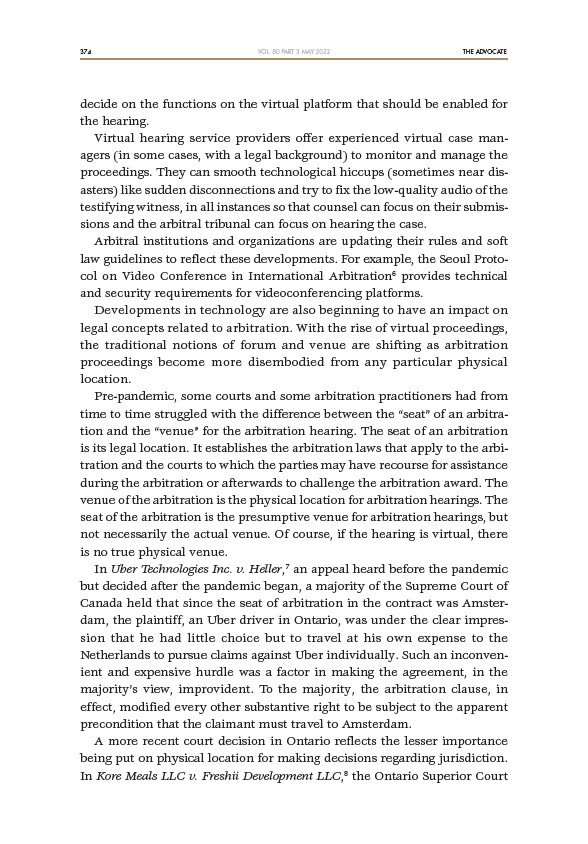
374 THE ADVOCATE
VOL. 80 PART 3 MAY 2022
decide on the functions on the virtual platform that should be enabled for
the hearing.
Virtual hearing service providers offer experienced virtual case managers
(in some cases, with a legal background) to monitor and manage the
proceedings. They can smooth technological hiccups (sometimes near disasters)
like sudden disconnections and try to fix the low-quality audio of the
testifying witness, in all instances so that counsel can focus on their submissions
and the arbitral tribunal can focus on hearing the case.
Arbitral institutions and organizations are updating their rules and soft
law guidelines to reflect these developments. For example, the Seoul Protocol
on Video Conference in International Arbitration6 provides technical
and security requirements for videoconferencing platforms.
Developments in technology are also beginning to have an impact on
legal concepts related to arbitration. With the rise of virtual proceedings,
the traditional notions of forum and venue are shifting as arbitration
proceedings become more disembodied from any particular physical
location.
Pre-pandemic, some courts and some arbitration practitioners had from
time to time struggled with the difference between the “seat” of an arbitration
and the “venue” for the arbitration hearing. The seat of an arbitration
is its legal location. It establishes the arbitration laws that apply to the arbitration
and the courts to which the parties may have recourse for assistance
during the arbitration or afterwards to challenge the arbitration award. The
venue of the arbitration is the physical location for arbitration hearings. The
seat of the arbitration is the presumptive venue for arbitration hearings, but
not necessarily the actual venue. Of course, if the hearing is virtual, there
is no true physical venue.
In Uber Technologies Inc. v. Heller,7 an appeal heard before the pandemic
but decided after the pandemic began, a majority of the Supreme Court of
Canada held that since the seat of arbitration in the contract was Amsterdam,
the plaintiff, an Uber driver in Ontario, was under the clear impression
that he had little choice but to travel at his own expense to the
Netherlands to pursue claims against Uber individually. Such an inconvenient
and expensive hurdle was a factor in making the agreement, in the
majority’s view, improvident. To the majority, the arbitration clause, in
effect, modified every other substantive right to be subject to the apparent
precondition that the claimant must travel to Amsterdam.
A more recent court decision in Ontario reflects the lesser importance
being put on physical location for making decisions regarding jurisdiction.
In Kore Meals LLC v. Freshii Development LLC,8 the Ontario Superior Court